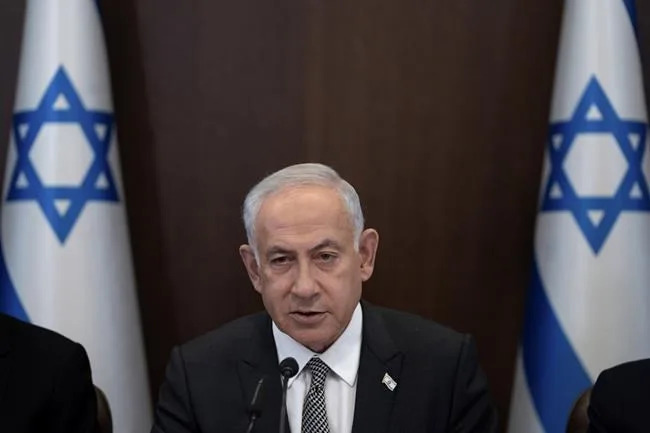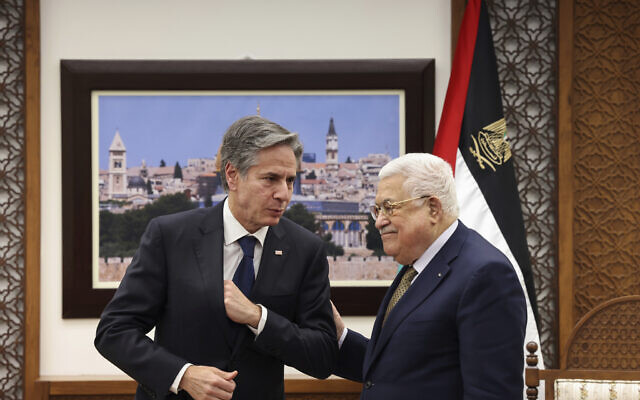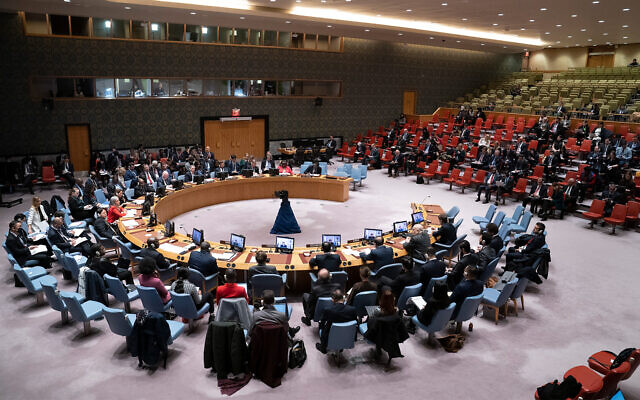Ukraine in mind, US frantic to avert Mideast showdown at UN
Sat, February 18, 2023

WASHINGTON (AP) — The Biden administration is scrambling to avert a diplomatic crisis over Israeli settlement activity this week at the United Nations that threatens to overshadow and perhaps derail what the U.S. hopes will be a solid five days of focus on condemning Russia’s war with Ukraine.
Secretary of State Antony Blinken made two emergency calls on Saturday from the Munich Security Conference, which he is attending in an as-yet unsuccessful bid to avoid or forestall such a showdown. It remained unclear whether another last-minute intervention might salvage the situation, according to diplomats familiar with the ongoing discussions who spoke to The Associated Press on condition of anonymity.
Without giving details, the State Department said in nearly identical statements that Blinken had spoken to Palestinian leader Mahmoud Abbas and Israeli Prime Minister Benjamin Netanyahu from Munich to “reaffirm the U.S. commitment to a negotiated two-state solution and opposition to policies that endanger its viability.”
“The secretary underscored the urgent need for Israelis and Palestinians to take steps that restore calm and our strong opposition to unilateral measures that would further escalate tensions,” the statements said.
Neither statement mentioned the proposed U.N. Security Council resolution demanding an immediate halt to Israeli settlements. The Palestinians want to bring that resolution to a vote on Monday. And neither statement gave any indication as to how the calls ended.
But diplomats familiar with the conversations said that in his call to Abbas, Blinken reiterated an offer to the Palestinians for a U.S. package of incentives to entice them to drop or at least delay the resolution.
Those incentives included a White House meeting for Abbas with President Joe Biden, movement on reopening the American consulate in Jerusalem, and a significant aid package, the diplomats said.
Abbas was noncommittal, the diplomats said, but also suggested he would not be amenable unless the Israelis agreed to a six-month freeze on settlement expansion on land the Palestinians claim for a future state.
Blinken then called Netanyahu, who, according to the diplomats, was similarly noncommittal about the six-month settlement freeze. Netanyahu also repeated Israeli opposition to reopening the consulate, which was closed during President Donald Trump's administration, they said.
The U.S. and others were hoping to resolve the deadlock on Sunday, but the diplomats said it was unclear if that was possible,
The drama arose just ahead of the one-year anniversary of the Russian invasion of Ukraine, which will be the subject of special U.N. General Assembly and Security Council sessions on Thursday and Friday.
The U.S. opposes the Palestinian resolution and is almost certain to veto it. Not vetoing would carry considerable domestic political risk for Biden on the cusp of the 2024 presidential race and top House Republicans have already warned against it.
But the administration also fears that using its veto to protect Israel risks losing support at the world body for measures condemning Russia's war in Ukraine.
Senior officials from the White House, the State Department and the U.S. Mission to the U.N. have already engaged frantic but fruitless diplomacy to try to persuade the Palestinians to back down. The dire nature of the situation prompted Blinken's calls on Saturday, the diplomats said.
The Biden administration has already said publicly that it does not support the resolution, calling it “unhelpful." But it has also said the same about recent Israeli settlement expansion announcements.
U.N. diplomats say the U.S wants to replace the Palestinian resolution, which would be legally binding, with a weaker presidential statement, or at least delay a vote on the resolution until after the Ukraine war anniversary.
The Palestinian push comes as Israel’s new right-wing government has reaffirmed its commitment to construct new settlements in the West Bank and expand its authority on land the Palestinians seek for a future state.
Israel captured the West Bank, along with east Jerusalem and the Gaza Strip, in the 1967 Mideast war. The United Nations and most of the international community consider Israeli settlements illegal and an obstacle to ending the decades-old Israeli-Palestinian conflict. Some 700,000 Israeli settlers live in the West Bank and Israeli-annexed east Jerusalem.
Ultranationalists who oppose Palestinian statehood comprise a majority of Israel’s new government, which has declared settlement construction a top priority.
The draft resolution, circulated by the United Arab Emirates, the Arab representative on the council, would reaffirm the Security Council’s “unwavering commitment” to a two-state solution with Israel and Palestine living side-by-side in peace as democratic states.
It would also reaffirm the U.N. Charter’s provision against acquiring territory by force and reaffirm that any such acquisition is illegal.
Last Tuesday, Blinken and the top diplomats from Britain, France, Germany and Italy condemned Israel’s plans to build 10,000 new homes in existing settlements in the West Bank and retroactively legalize nine outposts. Netanyahu’s Cabinet had announced the measure two days earlier, following a surge in violence in Jerusalem.
In December 2016, the Security Council demanded that Israel “immediately and completely cease all settlement activities in the occupied Palestinian territory, including East Jerusalem.” It stressed that halting settlement activities “is essential for salvaging the two-state solution.”
That resolution was adopted after President Barack Obama’s administration abstained in the vote, a reversal of the United States’ longstanding practice of protecting its close ally Israel from action at the United Nations, including by vetoing Arab-supported resolutions.
The draft resolution before the council now is much shorter than the 2016 document, though it reiterates its key points and much of what the U.S. and Europeans already said last week.
Complicating the matter for the U.S., the Security Council resolution was introduced and is supported by the UAE, an Arab partner of the United States that has also normalized relations with Israel, even as it has taken a tepid stance on opposing Russia’s attack on Ukraine.
The U.S. will be looking to the UAE and other council members sympathetic to the Palestinians to vote in favor of resolutions condemning Russia for invading Ukraine and calling for a cessation of hostilities and the immediate withdrawal of all Russian forces.
___
Associated Press writer Edith M. Lederer at the United Nations contributed to this report.
Matthew Lee, The Associated Press
Sat, February 18, 2023

WASHINGTON (AP) — The Biden administration is scrambling to avert a diplomatic crisis over Israeli settlement activity this week at the United Nations that threatens to overshadow and perhaps derail what the U.S. hopes will be a solid five days of focus on condemning Russia’s war with Ukraine.
Secretary of State Antony Blinken made two emergency calls on Saturday from the Munich Security Conference, which he is attending in an as-yet unsuccessful bid to avoid or forestall such a showdown. It remained unclear whether another last-minute intervention might salvage the situation, according to diplomats familiar with the ongoing discussions who spoke to The Associated Press on condition of anonymity.
Without giving details, the State Department said in nearly identical statements that Blinken had spoken to Palestinian leader Mahmoud Abbas and Israeli Prime Minister Benjamin Netanyahu from Munich to “reaffirm the U.S. commitment to a negotiated two-state solution and opposition to policies that endanger its viability.”
“The secretary underscored the urgent need for Israelis and Palestinians to take steps that restore calm and our strong opposition to unilateral measures that would further escalate tensions,” the statements said.
Neither statement mentioned the proposed U.N. Security Council resolution demanding an immediate halt to Israeli settlements. The Palestinians want to bring that resolution to a vote on Monday. And neither statement gave any indication as to how the calls ended.
But diplomats familiar with the conversations said that in his call to Abbas, Blinken reiterated an offer to the Palestinians for a U.S. package of incentives to entice them to drop or at least delay the resolution.
Those incentives included a White House meeting for Abbas with President Joe Biden, movement on reopening the American consulate in Jerusalem, and a significant aid package, the diplomats said.
Abbas was noncommittal, the diplomats said, but also suggested he would not be amenable unless the Israelis agreed to a six-month freeze on settlement expansion on land the Palestinians claim for a future state.
Blinken then called Netanyahu, who, according to the diplomats, was similarly noncommittal about the six-month settlement freeze. Netanyahu also repeated Israeli opposition to reopening the consulate, which was closed during President Donald Trump's administration, they said.
The U.S. and others were hoping to resolve the deadlock on Sunday, but the diplomats said it was unclear if that was possible,
The drama arose just ahead of the one-year anniversary of the Russian invasion of Ukraine, which will be the subject of special U.N. General Assembly and Security Council sessions on Thursday and Friday.
The U.S. opposes the Palestinian resolution and is almost certain to veto it. Not vetoing would carry considerable domestic political risk for Biden on the cusp of the 2024 presidential race and top House Republicans have already warned against it.
But the administration also fears that using its veto to protect Israel risks losing support at the world body for measures condemning Russia's war in Ukraine.
Senior officials from the White House, the State Department and the U.S. Mission to the U.N. have already engaged frantic but fruitless diplomacy to try to persuade the Palestinians to back down. The dire nature of the situation prompted Blinken's calls on Saturday, the diplomats said.
The Biden administration has already said publicly that it does not support the resolution, calling it “unhelpful." But it has also said the same about recent Israeli settlement expansion announcements.
U.N. diplomats say the U.S wants to replace the Palestinian resolution, which would be legally binding, with a weaker presidential statement, or at least delay a vote on the resolution until after the Ukraine war anniversary.
The Palestinian push comes as Israel’s new right-wing government has reaffirmed its commitment to construct new settlements in the West Bank and expand its authority on land the Palestinians seek for a future state.
Israel captured the West Bank, along with east Jerusalem and the Gaza Strip, in the 1967 Mideast war. The United Nations and most of the international community consider Israeli settlements illegal and an obstacle to ending the decades-old Israeli-Palestinian conflict. Some 700,000 Israeli settlers live in the West Bank and Israeli-annexed east Jerusalem.
Ultranationalists who oppose Palestinian statehood comprise a majority of Israel’s new government, which has declared settlement construction a top priority.
The draft resolution, circulated by the United Arab Emirates, the Arab representative on the council, would reaffirm the Security Council’s “unwavering commitment” to a two-state solution with Israel and Palestine living side-by-side in peace as democratic states.
It would also reaffirm the U.N. Charter’s provision against acquiring territory by force and reaffirm that any such acquisition is illegal.
Last Tuesday, Blinken and the top diplomats from Britain, France, Germany and Italy condemned Israel’s plans to build 10,000 new homes in existing settlements in the West Bank and retroactively legalize nine outposts. Netanyahu’s Cabinet had announced the measure two days earlier, following a surge in violence in Jerusalem.
In December 2016, the Security Council demanded that Israel “immediately and completely cease all settlement activities in the occupied Palestinian territory, including East Jerusalem.” It stressed that halting settlement activities “is essential for salvaging the two-state solution.”
That resolution was adopted after President Barack Obama’s administration abstained in the vote, a reversal of the United States’ longstanding practice of protecting its close ally Israel from action at the United Nations, including by vetoing Arab-supported resolutions.
The draft resolution before the council now is much shorter than the 2016 document, though it reiterates its key points and much of what the U.S. and Europeans already said last week.
Complicating the matter for the U.S., the Security Council resolution was introduced and is supported by the UAE, an Arab partner of the United States that has also normalized relations with Israel, even as it has taken a tepid stance on opposing Russia’s attack on Ukraine.
The U.S. will be looking to the UAE and other council members sympathetic to the Palestinians to vote in favor of resolutions condemning Russia for invading Ukraine and calling for a cessation of hostilities and the immediate withdrawal of all Russian forces.
___
Associated Press writer Edith M. Lederer at the United Nations contributed to this report.
Matthew Lee, The Associated Press
PA president briefs secretary of state on Palestinian-backed Security Council measure calling for halt to Israeli activity in West Bank; Blinken later calls PM to update him
By JACOB MAGID 18 February 2023,

U.S. Secretary of State Antony Blinken, left, meets with Palestinian leader Mahmoud Abbas in the West Bank town of Ramallah, Tuesday, January 31, 2023. (Ronaldo Schemidt/Pool via AP)
US Secretary of State Antony Blinken phoned Palestinian Authority President Mahmoud Abbas on Saturday, as Washington seeks to thwart a Ramallah-backed UN Security Council resolution demanding an immediate halt to Israeli settlement activity in the West Bank.
Later in the day, he called Netanyahu to update him on where things stood.
The Security Council resolution has placed the US in an uncomfortable position, as it too has spoken out aggressively against last Sunday’s decision by Israel to legalize nine outposts in the West Bank and advance plans for some 10,000 new settlement homes, the largest-ever package to be green-lit in one sitting.
Israel’s Judiciary: Reform or Ruin?Keep Watching
Additionally, the Biden administration has maintained that vetoes at the UN Security Council should be used sparingly and has been critical of Russia’s efforts to block consensus-backed initiatives over the past year. Vetoing this measure, which includes a condemnation of steps toward annexation by Israel — such as outpost legalizations, would put them at odds with countries it has asked to back UN resolutions against Russia for annexing Ukrainian lands.
However, the US has also said the UN is not the correct forum for adjudicating the Israeli-Palestinian conflict and has been critical of member states’ disproportionate and sometimes biased approach on the issue.
The Palestinian readout of the Saturday phone call said Abbas briefed Blinken on his office’s involvement in the Security Council initiative, which was drafted by the United Arab Emirates, the Arab League’s representative on the top UN panel.
Abbas said the UN effort was “a result of Israel’s insistence on violating signed agreements” and “underscored the need for Israel to stop all unilateral measures, including settlement construction, home demolitions, raids on cities and villages and the extrajudicial killings of Palestinians,” according to the PA readout.

Illustrative: Hayashi Yoshimasa, Minister for Foreign Affairs of Japan, chairs a Security Council meeting at United Nations headquarters in New York, January 12, 2023. (AP Photo/John Minchillo)
The PA president urged the US to “immediately and effectively intervene to press Israel to stop all these dangerous measures” to ensure the continued prospect of a two-state solution, his office said. It added that Blinken assured Abbas that he would reach out to the Israeli government “in an effort to stop the unilateral Israeli actions on the ground.”
The State Department later released a readout saying Blinken stressed “the US commitment to a negotiated two-state solution and opposition to policies that endanger its viability.”
“The secretary underscored the urgent need for Israelis and Palestinians to take steps that restore calm and our strong opposition to unilateral measures that would further escalate tensions. Secretary Blinken and President Abbas also discussed efforts to improve the quality of life of the Palestinian people and enhance their security and freedom,” the statement added.
In a tweet about his call with Netanyahu, Blinken characterized the conversation as “productive,” reiterating the same points that were highlighted in the readout on his dialogue with Abbas.
Israel framed its Sunday cabinet decision as a response to a series of terror attacks in East Jerusalem that left 11 Israeli dead. Meanwhile, nearly 50 Palestinians have been killed since the start of the year — most in clashes with troops, though several died under less clear circumstances being investigated by the IDF.
Senior Israeli officials have leaked anonymous statements to Hebrew media noting that it will take several years before the outposts — many of them built on private Palestinian land — will be formally legalized and before ground will be broken on the settlement homes that it’ll be advancing this week.
But such assurances have failed to satisfy the Biden administration, which is wholly unconvinced that further entrenching Israeli presence beyond the Green Line will help deter future terror attacks, a US official told The Times of Israel earlier this week. In his statement condemning the Israeli settlement announcement, Blinken said the moves would be “detrimental” to Israel’s security.
Nonetheless, the US spent the past several days urging Security Council members not to bring the resolution to a vote, instead proposing that they adopt a symbolic joint statement to the same effect, which Washington could get behind, according to three UN diplomats who spoke on condition of anonymity.
As of Friday afternoon though, members were still planning to bring the resolution to a vote on Monday, two senior UN diplomats said, when the Security Council will hold its monthly session to hear on developments relating to the Israeli-Palestinian conflict. However, they noted that capitals were still holding consultations on the matter and that the situation was fluid.
The last time a resolution against Israel on settlements was passed by the Security Council was in December 2016. Fourteen of the body’s 15 members backed the measure while the US, under then-US president Barack Obama, decided to abstain to allow the resolution to pass, infuriating Jerusalem in the process.
No comments:
Post a Comment